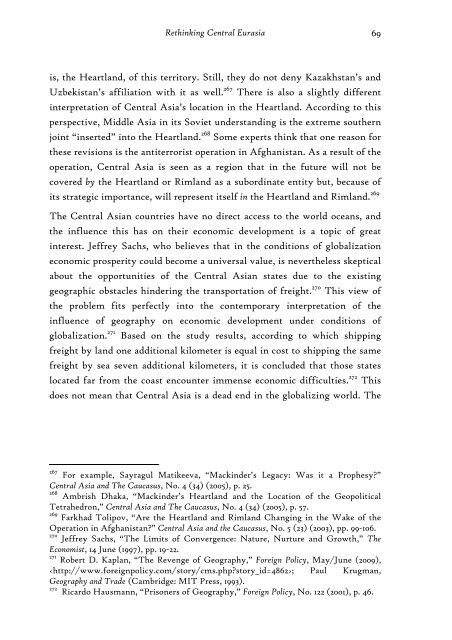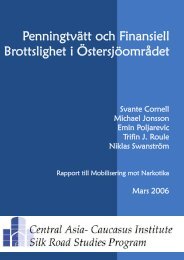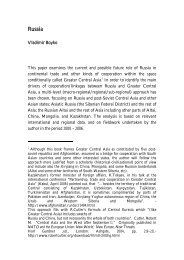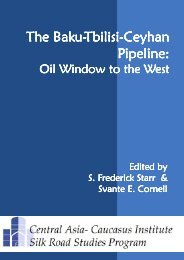Eurasianism and the Concept of Central Caucaso-Asia
Eurasianism and the Concept of Central Caucaso-Asia
Eurasianism and the Concept of Central Caucaso-Asia
You also want an ePaper? Increase the reach of your titles
YUMPU automatically turns print PDFs into web optimized ePapers that Google loves.
Rethinking <strong>Central</strong> Eurasia 69<br />
is, <strong>the</strong> Heartl<strong>and</strong>, <strong>of</strong> this territory. Still, <strong>the</strong>y do not deny Kazakhstan’s <strong>and</strong><br />
Uzbekistan’s affiliation with it as well. 267 There is also a slightly different<br />
interpretation <strong>of</strong> <strong>Central</strong> <strong>Asia</strong>’s location in <strong>the</strong> Heartl<strong>and</strong>. According to this<br />
perspective, Middle <strong>Asia</strong> in its Soviet underst<strong>and</strong>ing is <strong>the</strong> extreme sou<strong>the</strong>rn<br />
joint “inserted” into <strong>the</strong> Heartl<strong>and</strong>. 268 Some experts think that one reason for<br />
<strong>the</strong>se revisions is <strong>the</strong> antiterrorist operation in Afghanistan. As a result <strong>of</strong> <strong>the</strong><br />
operation, <strong>Central</strong> <strong>Asia</strong> is seen as a region that in <strong>the</strong> future will not be<br />
covered by <strong>the</strong> Heartl<strong>and</strong> or Riml<strong>and</strong> as a subordinate entity but, because <strong>of</strong><br />
its strategic importance, will represent itself in <strong>the</strong> Heartl<strong>and</strong> <strong>and</strong> Riml<strong>and</strong>. 269<br />
The <strong>Central</strong> <strong>Asia</strong>n countries have no direct access to <strong>the</strong> world oceans, <strong>and</strong><br />
<strong>the</strong> influence this has on <strong>the</strong>ir economic development is a topic <strong>of</strong> great<br />
interest. Jeffrey Sachs, who believes that in <strong>the</strong> conditions <strong>of</strong> globalization<br />
economic prosperity could become a universal value, is never<strong>the</strong>less skeptical<br />
about <strong>the</strong> opportunities <strong>of</strong> <strong>the</strong> <strong>Central</strong> <strong>Asia</strong>n states due to <strong>the</strong> existing<br />
geographic obstacles hindering <strong>the</strong> transportation <strong>of</strong> freight. 270 This view <strong>of</strong><br />
<strong>the</strong> problem fits perfectly into <strong>the</strong> contemporary interpretation <strong>of</strong> <strong>the</strong><br />
influence <strong>of</strong> geography on economic development under conditions <strong>of</strong><br />
globalization. 271 Based on <strong>the</strong> study results, according to which shipping<br />
freight by l<strong>and</strong> one additional kilometer is equal in cost to shipping <strong>the</strong> same<br />
freight by sea seven additional kilometers, it is concluded that those states<br />
located far from <strong>the</strong> coast encounter immense economic difficulties. 272 This<br />
does not mean that <strong>Central</strong> <strong>Asia</strong> is a dead end in <strong>the</strong> globalizing world. The<br />
267<br />
For example, Sayragul Matikeeva, “Mackinder’s Legacy: Was it a Prophesy?”<br />
<strong>Central</strong> <strong>Asia</strong> <strong>and</strong> The Caucasus, No. 4 (34) (2005), p. 25.<br />
268<br />
Ambrish Dhaka, “Mackinder’s Heartl<strong>and</strong> <strong>and</strong> <strong>the</strong> Location <strong>of</strong> <strong>the</strong> Geopolitical<br />
Tetrahedron,” <strong>Central</strong> <strong>Asia</strong> <strong>and</strong> The Caucasus, No. 4 (34) (2005), p. 57.<br />
269<br />
Farkhad Tolipov, “Are <strong>the</strong> Heartl<strong>and</strong> <strong>and</strong> Riml<strong>and</strong> Changing in <strong>the</strong> Wake <strong>of</strong> <strong>the</strong><br />
Operation in Afghanistan?” <strong>Central</strong> <strong>Asia</strong> <strong>and</strong> <strong>the</strong> Caucasus, No. 5 (23) (2003), pp. 99-106.<br />
270<br />
Jeffrey Sachs, “The Limits <strong>of</strong> Convergence: Nature, Nurture <strong>and</strong> Growth,” The<br />
Economist, 14 June (1997), pp. 19-22.<br />
271<br />
Robert D. Kaplan, “The Revenge <strong>of</strong> Geography,” Foreign Policy, May/June (2009),<br />
; Paul Krugman,<br />
Geography <strong>and</strong> Trade (Cambridge: MIT Press, 1993).<br />
272<br />
Ricardo Hausmann, “Prisoners <strong>of</strong> Geography,” Foreign Policy, No. 122 (2001), p. 46.






